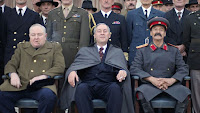Franklin Delano Roosevelt should be studied for one thing above all: how to serve as commander-in-chief during wartimes. Throughout WWII, Roosevelt maintained a long-term strategic perspective. Today, if over 7,000 American service personnel were killed in a single battle, the press would probably call for the President to be impeached, but that is exactly what happened at Guadalcanal, relatively early in the war. Director Malcolm Venville and producer-chief talking head Doris Kearns Goodwin again use her book Leadership in Turbulent Times as a road-map for the three-part FDR, which starts tomorrow night on History Channel.
As in the previous Abraham Lincoln and Teddy Roosevelt, Venville incorporates dramatic interludes to illustrate episodes from Roosevelt life under discussion. In this case, the casting of Christian McKay (who was terrific playing Orson Welles in Richard Linklater’s Me and Orson Welles) is the best of the History Channel hybrid docs, since Graham Sibley played Lincoln. With the help of some makeup, McKay convincingly portrays the young and dashing Roosevelt up through his tragic Yalta decline.
Kearns and her colleagues’ commentary on FDR’s early years is somewhat revealing. It probably is not well known how deliberately FDR patterned his political career on that of his fifth-cousin, Teddy Roosevelt (jumping from the state legislature, to assistant secretary of the Navy, and then to the governorship). In fact, Eleanor Roosevelt was more closely related to TR, since she was his niece. Kearns and company largely admire FDR’s politically astute tight-rope walking, when he served as a prominent surrogate for Woodrow Wilson’s presidential campaign, against TR. However, they never hold him to account for supporting Wilson, who did more than any other president to institutionalize racial segregation.
Unlike, Teddy Roosevelt, which includes ample criticism of TR, FDR features nothing but praise for its subject (except for maybe a few minutes on the Japanese-American internment). The lack of diverse perspectives is glaringly obvious during talk of the New Deal. Frankly, many of FDR’s policies prolonged rather than fixed the Great Depression. The timeliness of FDR’s court-packing debacle is also lost on the collected historians.
Yet, in terms of political biases, the worst over all three episodes is the selective editing that makes Wendell Wilkie, the 1940 GOP presidential candidate, look like an isolationist, when he was probably even more of an internationalist than FDR, at that time. Seriously, Goodwin should be embarrassed.
Fortunately, the coverage of WWII is solid, which it needed to be. As commander-in-chief, FDR did what was necessary to defeat the Axis powers and preserve democracy and capitalism. FDR is probably the greatest American wartime president ever, at least up until Yalta. Goodwin and her fellow commentators spin the Crimean summit to some extent, but they acknowledge the tragic implications for Eastern Europe. However, they clearly explain the life-and-death decisions FDR had to make and how he carried the heavy burden.
Honestly, we need to regularly revisit WWII and the events leading up to it, because there are still pressing lessons for us to apply as a nation. Arguably, America was much more isolationist when FDR first took office (again, Wilson deserved a great deal of the blame), but there is still a short-sighted tendency to ignore international threats until it is almost too late. Fortunately, we do not need a “lend-lease” work-around to aid Taiwan and Ukraine—just the will. Recommended almost exclusively for the WWII coverage, FDR starts airing Monday (5/29) on History Channel.

